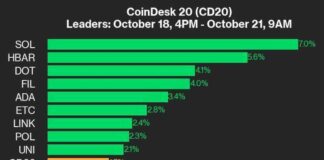Nigeria SEC Cracks Down on Unlicensed Crypto Firms: A Deep Dive
Nigeria’s Securities and Exchange Commission (SEC) has recently announced its intention to crack down on unlicensed crypto firms operating within the country. This move comes as part of the SEC’s efforts to regulate the rapidly growing cryptocurrency market and protect Nigerian citizens from potential risks associated with unregulated trading.
Enforcement Action Against Unlicensed Crypto Firms
Emomotimi Agama, the Director General of the SEC, emphasized the importance of enforcing regulations on all crypto firms operating in Nigeria. In a statement to local media outlets, Agama stated, “We are certainly going to commence enforcement actions on anyone who wants to operate in this market and does not have the intention of being regulated.” This indicates the SEC’s strong stance on ensuring compliance with regulatory standards in the crypto industry.
The SEC’s crackdown on unlicensed crypto firms aims to send a clear message that operating outside the regulatory framework will not be tolerated. By taking enforcement action, the SEC seeks to establish a level playing field for all participants in the cryptocurrency market and protect investors from potential fraud or exploitation.
Licensing of Crypto Firms in Nigeria
While cracking down on unlicensed crypto firms, the SEC has also been actively issuing licenses to legitimate cryptocurrency exchanges. Last month, Nigeria announced its decision to grant licenses to crypto firms, with cryptocurrency exchanges Quidax and Busha being among the first recipients. This move is aimed at promoting responsible and regulated trading practices within the country’s crypto market.
Despite the issuance of licenses to certain crypto firms, Nigeria’s approach to regulating the cryptocurrency industry remains stringent. The country has previously blocked exchanges from operating within its borders, signaling its commitment to upholding regulatory standards. However, some reports have indicated that certain exchanges, such as Coinbase, have managed to maintain accessibility in Nigeria despite regulatory challenges.
Guidance on Preventing Criminal Activity
In an effort to combat criminal activities within the crypto industry, Nigeria released guidance in March to prevent criminals from registering as operators in the market. This proactive measure demonstrates the SEC’s commitment to safeguarding the integrity of the cryptocurrency market and protecting investors from potential scams or illicit activities.
Ongoing Trial Against Binance Exchange
Nigeria is currently embroiled in a legal battle against the Binance exchange and two of its executives. The trial has garnered significant attention, with one of the executives reportedly falling severely ill after being detained for over six months. As a result, the executive is seeking bail, highlighting the complexities and challenges faced by crypto firms operating in Nigeria’s regulatory environment.
Market Development and Innovation
Despite the enforcement actions being taken by the SEC, Agama emphasized that the regulator’s primary responsibility is market development. He stated, “All this we seek to do without hindering innovation because part of our primary responsibility as the SEC is market development.” This statement underscores the SEC’s commitment to fostering innovation while ensuring compliance with regulatory standards in the crypto industry.
In Conclusion
Overall, Nigeria’s SEC’s crackdown on unlicensed crypto firms reflects the regulator’s proactive approach to regulating the cryptocurrency market and protecting investors from potential risks. By enforcing regulations and issuing licenses to legitimate crypto firms, the SEC aims to promote responsible trading practices and maintain the integrity of Nigeria’s crypto industry. As the regulatory landscape continues to evolve, it is essential for all market participants to adhere to the SEC’s guidelines and contribute to the sustainable growth of the cryptocurrency market in Nigeria.

















